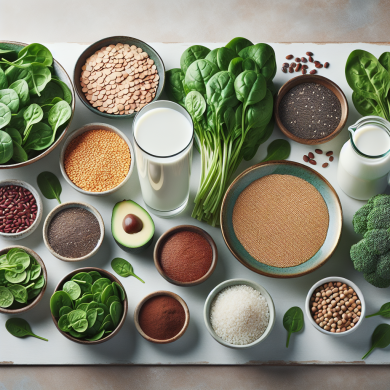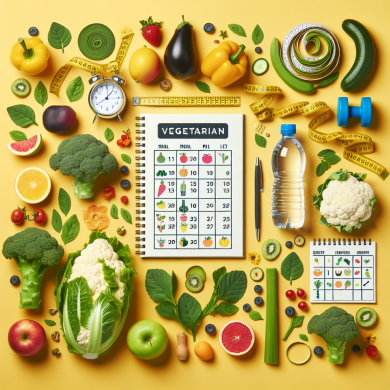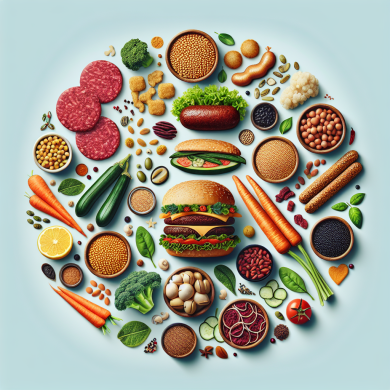Unveiling Nutrient Gaps in Vegetarian Diets
Introduction
The vegetarian diet has gained immense popularity due to its numerous health benefits, ethical considerations, and environmental sustainability. Embracing a vegetarian lifestyle often involves abstaining from meat and sometimes other animal products, which can lead to certain nutrient deficiencies if not managed properly. This article aims to explore the nutrient gaps often found in vegetarian diets, the health implications of these deficiencies, and strategies to ensure a balanced and nutritious vegetarian eating plan.
The Rise of Vegetarianism
Over the past few decades, the vegetarian diet has been adopted by millions worldwide. This increase can be attributed to rising awareness about animal welfare, the environmental impact of meat production, and the health benefits associated with plant-based diets. However, while vegetarian diets are generally lower in saturated fats and cholesterol, they can sometimes lack essential nutrients typically obtained from animal sources.
Essential Nutrients Often Lacking in Vegetarian Diets
Protein
One of the most discussed nutrients in vegetarian diets is protein. While plant-based sources such as legumes, nuts, seeds, and whole grains provide protein, they often lack one or more of the essential amino acids necessary for optimal health. Complete proteins, which contain all nine essential amino acids, are primarily found in animal products. Vegetarians must therefore combine different plant protein sources to ensure they receive all the necessary amino acids. For example, pairing beans with rice or hummus with whole-grain bread can provide a complete amino acid profile.
Vitamin B12
Vitamin B12 is crucial for nerve function, the production of DNA, and the formation of red blood cells. It is naturally found in significant amounts only in animal products, making it a common deficiency in vegetarian diets. Symptoms of B12 deficiency include fatigue, nerve damage, and cognitive disturbances. Vegetarians should consider fortified foods such as plant-based milks, breakfast cereals, and nutritional yeast, or take B12 supplements to meet their dietary needs.
Iron
Iron is essential for producing hemoglobin, a protein in red blood cells that carries oxygen throughout the body. Plant-based iron, known as non-heme iron, is less readily absorbed by the body compared to heme iron from animal sources. To enhance iron absorption, vegetarians should consume iron-rich foods such as lentils, spinach, and tofu alongside vitamin C-rich foods like citrus fruits, tomatoes, and bell peppers.
Omega-3 Fatty Acids
Omega-3 fatty acids are vital for brain health, reducing inflammation, and supporting heart health. The primary sources of omega-3s, specifically EPA and DHA, are fish and seafood. Vegetarians can obtain omega-3s from flaxseeds, chia seeds, walnuts, and algae-based supplements, which provide the precursor ALA (alpha-linolenic acid) that the body can partially convert into EPA and DHA.
Calcium
Calcium is critical for bone health, muscle function, and nerve signaling. While dairy products are a rich source of calcium, vegetarians who exclude dairy must rely on alternatives such as fortified plant milks, tofu made with calcium sulfate, almonds, and leafy green vegetables like kale and bok choy to meet their calcium requirements.
Zinc
Zinc plays a key role in immune function, wound healing, and DNA synthesis. Plant-based sources of zinc, such as beans, lentils, nuts, and seeds, are not as easily absorbed as animal-based zinc. Vegetarians should include a variety of these foods in their diet and consider soaking or sprouting legumes and grains to enhance zinc bioavailability.
Health Implications of Nutrient Deficiencies
Inadequate intake of these nutrients can have significant health consequences. Protein deficiency can lead to muscle wasting, weakened immune function, and delayed wound healing. Vitamin B12 deficiency can cause anemia and neurological issues. Insufficient iron intake can result in iron-deficiency anemia, characterized by fatigue, weakness, and impaired cognitive function. A lack of omega-3 fatty acids may affect cardiovascular health and cognitive performance. Calcium deficiency can weaken bones, increasing the risk of fractures and osteoporosis. Zinc deficiency can impair immune response and slow growth in children.
Strategies to Address Nutrient Gaps
Variety and Balance
To ensure a well-rounded vegetarian diet, it is crucial to consume a wide variety of foods. Incorporating diverse plant-based protein sources, whole grains, fruits, vegetables, nuts, and seeds can help cover the spectrum of essential nutrients. Planning meals with balance and variety in mind will reduce the risk of nutrient deficiencies.
Fortified Foods and Supplements
Fortified foods and supplements can play a significant role in meeting the nutritional needs of vegetarians. Foods fortified with vitamin B12, calcium, and vitamin D can help bridge nutrient gaps. Omega-3 supplements derived from algae provide an excellent alternative to fish oil. Additionally, consulting with a healthcare professional or a registered dietitian can help determine individual supplement needs based on dietary patterns and health requirements.
Mindful Cooking Techniques
Cooking techniques can influence the nutrient content and absorption in vegetarian diets. For instance, soaking, sprouting, or fermenting legumes and grains can increase the bioavailability of certain minerals like zinc and iron. Cooking vegetables lightly or consuming them raw can preserve their vitamin content. Using cast-iron cookware can also increase the iron content of foods.
Conclusion
While vegetarian diets offer numerous health benefits and align with ethical and environmental considerations, they can present challenges in obtaining certain essential nutrients. By understanding potential nutrient gaps and implementing strategies to address them, vegetarians can enjoy a balanced and nutritious diet. Emphasizing variety, incorporating fortified foods, considering supplements, and employing mindful cooking techniques are effective ways to ensure optimal nutrition in a vegetarian lifestyle. With proper planning and awareness, vegetarians can thrive and maintain their health and well-being on a plant-based diet.















Add comment